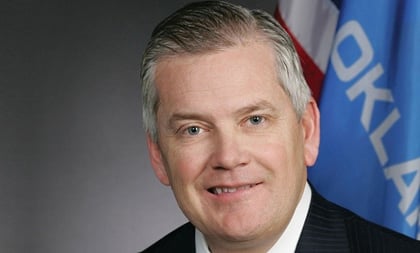Seven states held some kind of primary election or special election Tuesday. For many voters, the overriding question about those elections may be have been, “Was there really an election today, or are you just trying to fool me?”
Some of those little-noticed, low-participation elections could have implications for life and health insurance agents.
(Related: Doak to Senate Panel: Audit the ACA Navigators)
Here’s a look at some of the results that could affect the everyday lives of agents, and especially of those who are active in professional groups’ legislative affairs efforts.
1. Oklahoma will be getting a new insurance commissioner.
Oklahoma elects its insurance commissioners. The state held Republican and Democratic commissioner primaries Tuesday.
The Contenders
The Republicans: The Republican primary candidates were Donald Chasteen and Glen Mulready.
Mulready won, with 54.75% of the 399,690 votes cast.
Mulready is a member of the Oklahoma House. He is also owns an employee benefits brokerage and consulting firm, Benefit Plan Strategies of Tulsa.
From 2001 through 2007, Mulready was vice president of marketing at Blue Cross Blue Shield of Oklahoma. He set up his own benefits firm in 2008.
Mulready says on his website that he wants to vigilant about regulating insurer solvency, insurance producer honesty and insurer claim payment practices.
He also says that it wants to expand consumer access to insurance options and create a business-friendly environment.
The Democrat: Kimberly Fobbs, the chair of the Tulsa County Democratic Party, was not on the ballot on Tuesday, because she is the only Democrat running for commissioner in Oklahoma in November.
She worked at units of MetLife Inc. from 1990 through 20106. She helped manage product call center performance, both for institutional products and for individual life and annuity products. Her credentials include certifications from LOMA.
The Commissioner Who’s Leaving
John Doak, the current commissioner, will be leaving his post at the end of the year, because of state-imposed term limits.
Doak, a fiscally conservative Republican, has been active in efforts to oppose the Affordable Care Act. In September 2017, for example, he called at a Senate hearing for Congress to investigate the organizations working as ACA public exchange system navigators, or consumer helpers.
Doak has focused mainly on participating in property-casualty committees at the National Association of Insurance Commissioners, but he is a member of the NAIC’s Innovation and Technology Task Force, and he has represented the NAIC at the Organisation for Economic Co-operation and Development.
2. The odds that South Carolina will keep its current top insurance regulator have increased.
South Carolina has an appointed insurance department director: Raymond Farmer.









 June 28, 2018 at 01:30 PM
June 28, 2018 at 01:30 PM








